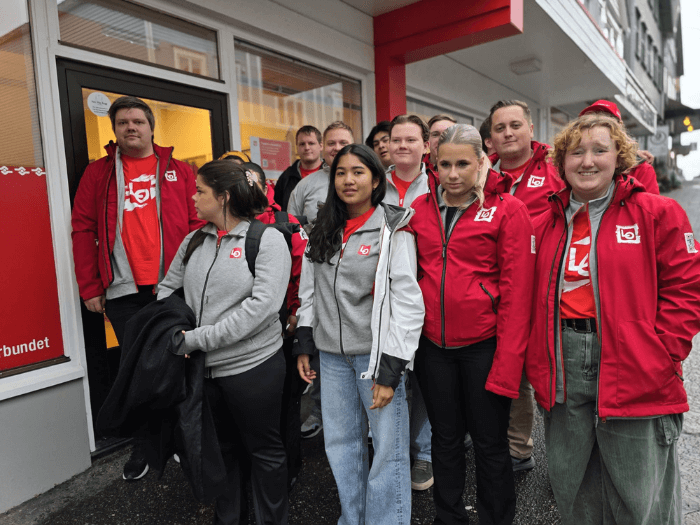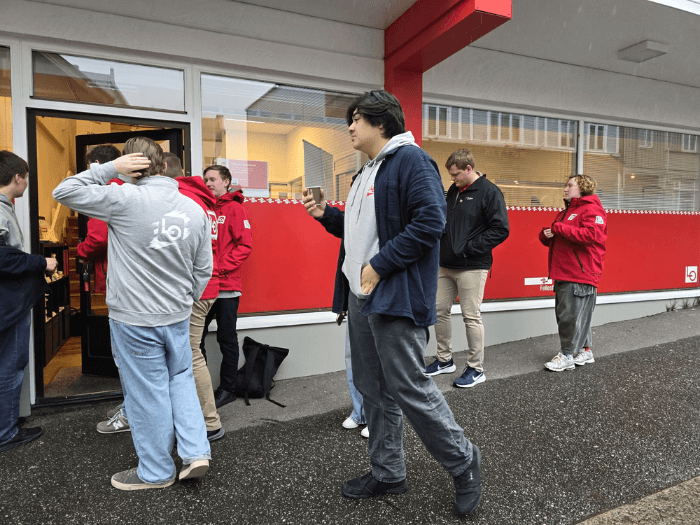Earlier this year I travelled to Haugesund and Stavanger in Norway representing the Musicians’ Union, Trades Union Congress (TUC) and TUC North East as a young music industry worker on LO-Norway's annual Summer Patrol. LO is Norway’s equivalent of the TUC and we were there to learn as much as we could about summer patrols to bring back to the union movement in the UK.
Educating young people on the benefits of joining a union
For those of you not familiar with a trade union patrol – and don’t be worried if this is you as it was definitely me before I had this opportunity! - a patrol is an organising activity where trade union members go directly into workplaces to speak to their employees about their pay, terms and conditions, and workers’ rights.
LO’s Summer Patrol takes an inquisitive approach, finding out what works and what doesn’t for young workers and how the LO can help. This patrol focused on young workers under 35, understanding where young people work and informing and educating them on the benefits of joining a union.
Having now run for over 40 years and operating in most regions across Norway, LO’s Summer Patrol is familiar to many people across the country - not only amongst its young members, who form a high proportion of the LO’s membership, but also older generations who have seen this event happen over many years.
Coming from the UK, where union patrols are not so well known amongst young people, myself and Lily Harrison (a young carer representing UNISON) arrived as complete newbies to this experience. We didn’t quite know what to expect but were fantastically supported by TUC Policy and Campaigns Officer Safiyya Patel.
How trade union patrols work
We were buddied up with a handful of superbly friendly and supportive Norwegian young workers - Marcus, Steven and Gunnar – and divided into small groups. LO allocated us specific areas in which to investigate how the region’s young workers were treated and how satisfied they were in their workplaces.
We’d go into workplaces unannounced and ask to speak to a young employee under 35. We asked them a set list of questions about their rate of pay, collective bargaining agreements, employee satisfaction, surveillance in the workplace and more.
Workplaces we visited consisted mostly of shops, bakeries, cafes, pharmacies, political buildings and more. As a creative worker, I also encouraged our group to visit as many cultural venues as we could in our allocated areas. This led to some interesting conversations at venues such as an arts focused youth centre, film house, and a museum and cafe in an art gallery.
But there were some barriers to including cultural venues in the existing patrol framework. Our main barriers included the opening times of cultural venues, which differed from the times of the patrol. The patrol ran from 10am-4pm but many performance venues only opened to the public at night, and those venues that were open during the day did not have any young workers on shift at that time (for example, on box office). Some venues were already closed for their summer break.
 A group of young workers during the LO-Norway summer patrol. Photo credit: Marianne Sice.
A group of young workers during the LO-Norway summer patrol. Photo credit: Marianne Sice.
Talking about pay, terms and conditions
Of the young employees we did speak to across a wide variety of workplaces, most were very friendly, open and willing to talk to us at the LO about their employment experience.
I found this very welcoming and refreshing but also quite surprising as discussing topics such as income and earnings - especially with people that you don’t know, who have turned up at your workplace unannounced - is still considered fairly taboo in the UK. It demonstrates an awareness of and trust in what the LO is and does, and its perception amongst young people in Norway.
One thing I found particularly inspiring was the level of knowledge of young workers’ rights that many people we came across had. Hearing stories throughout the week about older young workers educating and standing up for the rights of their younger co-workers whilst at work shows what is possible.
One young member we met was Morten, who obtained collective bargaining agreements for themselves and their entire workforce in workplaces where that seemed nearly impossible, and then went on to run as a candidate for the Norwegian Parliament. It was great to see young workers on the Summer Patrol as mentors for their younger colleagues in the Summer Patrol as well.
I really do believe that having a solid understanding, knowledge and education on the ins and outs of young workers’ rights and union membership was a big factor in being able to recruit and educate the young workers we visited in their workplaces.
Challenges of patrols for creative and cultural workers
Of course, we did face challenges on the patrol, with some employers not allowing us to freely speak to their employees or, if they did, maintaining a watchful eye over them. A lack of young employees available, time constraints, disinterest in the project, or dislike of trade unions were amongst some of the reasons given for declining a visit from the LO Summer Patrol.
Interestingly, we had daily debriefs with groups that had been covering other areas in the allocated regions that day and, through these, we learned that the LO Summer Patrol was uncovering serious workers’ rights violations, which may explain why some businesses did not want any questions asked!
In my own experience of the patrol, I felt that, although there were challenges, the whole experience was very insightful and the majority of people we came across were very friendly, open and curious about what we were doing.
Adapting the Summer Patrol model for the UK
So, what was the purpose of TUC North East representatives from different UK trade unions going on the LO’s Summer Patrol? To learn from those we shadowed and bring this knowledge back to the UK in order to host our own union patrols later this year.
The next Northern Patrol will be hosted by the TUC and take place in Sheffield on Saturday 29 November 2025. Unfortunately, it’s not a summer one! But it takes place during November, which is TUC Young Workers’ Month and when many young worker patrols take place across England and Wales.
The model will need to be adapted in the UK as we may be unable to go into workplaces unannounced. It would help to do a community mapping exercise beforehand to determine who we would like to speak to, where they’re at and who to ask for permission to come in and visit.
As these workplace visits are likely to be predetermined, I believe this gives us further scope to ensure that a variety of workplaces are visited - including creative and cultural venues – with a variety of different working modalities, conditions and contracts.
 A group of young workers visiting a a workplace in Norway. Photo credit: Marianne Sice.
A group of young workers visiting a a workplace in Norway. Photo credit: Marianne Sice.
Ensuring freelancers are included in every trade union patrol
Patrols are an opportunity to speak to freelancers and those on zero-hour contracts at cultural venues, to ensure their voices are heard and that things are being done to address issues young workers are experiencing in the creative industries, as well as other industries that hire freelancers.
The trade union movement needs to do more education, awareness raising and campaigning to inform young workers, whether they are members of a trade union or not, of their rights in order for things to improve. It’s also important for young workers to be able to have these conversations amongst themselves.
These voices need to be louder for those working freelance especially, where grey areas really do exist in terms of the rights and protections that they are entitled to. This is and can be quite frightening when it comes to dealing with issues like sexual harassment and bullying in the workplace. It’s vital that young workers know how to navigate their rights and how their trade union can support them.
An opportunity for young people to help shape the future of the creative workforce
A union patrol inclusive of the creative and cultural industries, visiting music venues and similar, would be helpful to inform us about what’s going on in our industries through the eyes of the young people working in it. Especially given the issues music industry workers regularly face in terms of exploitation, harassment and discrimination - let alone having to deal with grey areas in terms of employment rights.
The patrol model would need to be adapted to the working patterns and environments of creative freelancers. Many creatives work at venues only open at night or on weekends and have irregular working hours, and different questions would need to be asked than of those working a 9 to 5 in stable employment. Questions can easily be adapted to be inclusive of us and that’s something we have to bring to the table as members when patrols are organised by our regional TUCs.
There is also an opportunity here for young people to help shape the future of the creative workforce. With the right ideas and people working together, patrols are an opportunity to make way for real change in the industry with young music industry workers’ voices at the heart of this work.
Advice: How to Talk to Creative and Freelance Workers on a Trade Union Patrol
Are you going or interested in going on a trade union patrol?
Explore our advice on common questions to ask - and how to adapt them with creative and freelance workers in mind.